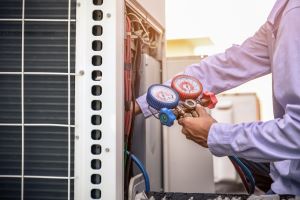Choose DMAKS HVAC for Reliable and Professional HVAC Solutions.
Choose DMAKS HVAC for Reliable and Professional HVAC Solutions.
Blog Article
Just How to Select the Right HVAC System for Your Needs
Choosing the appropriate heating and cooling system is an important choice that needs cautious consideration of different aspects. Begin by examining your home's dimension, format, and unique needs, as these components dictate the necessary capacity and arrangement of the system. Furthermore, establishing a spending plan that encompasses installment and long-term functional prices is essential. As you evaluate your alternatives, recognizing energy effectiveness rankings and the ramifications of your regional climate will play a considerable duty in your selection. The myriad of system types offered can complicate this process, leading one to ask yourself which course ultimately leads to optimum convenience and effectiveness.
Assess Your Home Size
Evaluating your home size is a critical first step in picking the proper A/c system. A Cooling and heating system that is also tiny will certainly struggle to preserve comfortable temperature levels, leading to increased power consumption and wear on the device.
To accurately analyze your home dimension, gauge the square footage of each space, thinking about factors such as ceiling elevation and the design. Furthermore, consider the insulation top quality and the variety of windows, as these aspects impact thermal efficiency. Homes with open layout may call for various system setups contrasted to those with numerous divided rooms.
Utilizing the Handbook J lots calculation technique can provide a much more specific quote of your a/c needs. This approach represent numerous elements, consisting of regional environment, solar gain, and tenancy patterns. By very carefully reviewing these aspects, you can ensure that your selected cooling and heating system is appropriately sized, resulting in enhanced comfort, power efficiency, and longevity of the tools.
Determine Your Budget Plan
Identifying your spending plan is an essential step in the a/c system selection process, as it establishes the criteria for your alternatives - DMAKS HVAC. A heating and cooling system is a considerable financial investment, and comprehending your financial limitations will certainly assist tighten down options that fit within your methods
Begin by assessing not only the initial acquisition price yet additionally installment prices, which can differ dramatically depending on the complexity of the job. Additionally, take into consideration recurring costs such as upkeep, repairs, and power consumption. A system might appear affordable initially but can result in higher expenses over time if it is much less reliable.
It is recommended to assign a contingency fund for unanticipated expenditures that might develop throughout installation or preliminary system changes (DMAKS HVAC). Additionally, explore financing choices or rebates that may be available, as these can reduce the burden of in advance costs
Eventually, having a clear budget plan enables you to involve with a/c specialists better, guaranteeing you get customized advice that lines up with your financial objectives and home demands. By being diligent about your spending plan, you can make educated decisions that improve comfort without compromising monetary security.
Evaluate Power Efficiency
Energy performance plays an important function in the general performance and cost-effectiveness of your HVAC system. Look for systems with a high Seasonal Power Performance Ratio (SEER) for cooling and a high Annual Gas Application Effectiveness (AFUE) ranking for home heating.
In addition, take into consideration the Power Star qualification, which symbolizes that the system meets strict performance standards set by the Environmental Protection Agency. Buying a Power Star-rated cooling and heating system can result in significant savings in time, specifically in locations with extreme temperature level variations.
Another variable to assess is the system's dimension and ability. An extra-large or small system can lead to inadequacy and raised power costs. DMAKS HVAC. Correct sizing, commonly figured out with a Hands-on J lots estimation, guarantees that the system operates at optimal efficiency


Consider Environment and Atmosphere
When selecting a cooling and heating system, it is crucial to consider the local environment and environmental problems, as these elements dramatically influence the system's efficiency and efficiency. Various areas experience differing temperature extremes, humidity levels, and seasonal changes, every one of which impact heating and cooling needs.

Moreover, neighborhood environmental factors, such as air top quality and prospective irritants, should educate your selection. Equipments geared up with advanced purification technologies can help minimize contaminants and provide cleaner air. In addition, take into consideration the power resources readily available in your area-- some heating and cooling systems are extra effective when powered by natural gas or sustainable energy sources.
Eventually, aligning your heating and cooling system option with your local environment and environmental factors to consider will certainly lead to boosted comfort, improved performance, and lower energy prices.
Explore System Types and Attributes
As homeowners seek to maximize comfort and effectiveness, discovering the different types of heating and cooling systems and their unique attributes comes to be vital. The primary sorts of a/c systems include central air, heat pumps, ductless mini-split systems, and heaters. Each system provides distinct benefits customized to various needs and preferences.
Central air conditioning systems offer uniform cooling throughout a home, making them ideal for larger areas. Heatpump function as both home heating and cooling remedies, using electrical power to move heat, which can lead to reduced energy costs. Ductless mini-split systems are coming to be progressively popular as a result of their adaptability and simplicity of installment, enabling house owners to control the temperature in private spaces without considerable ductwork.

Verdict
To conclude, selecting the proper HVAC system demands mindful consideration of different variables, consisting of home size, view budget plan restraints, energy effectiveness, neighborhood environment, and readily available system kinds. A complete analysis of these aspects guarantees optimal convenience and cost-effectiveness. By adhering to a structured method, home owners can make educated choices that align with their certain needs and choices, ultimately resulting in improved interior air quality and power savings.
Report this page